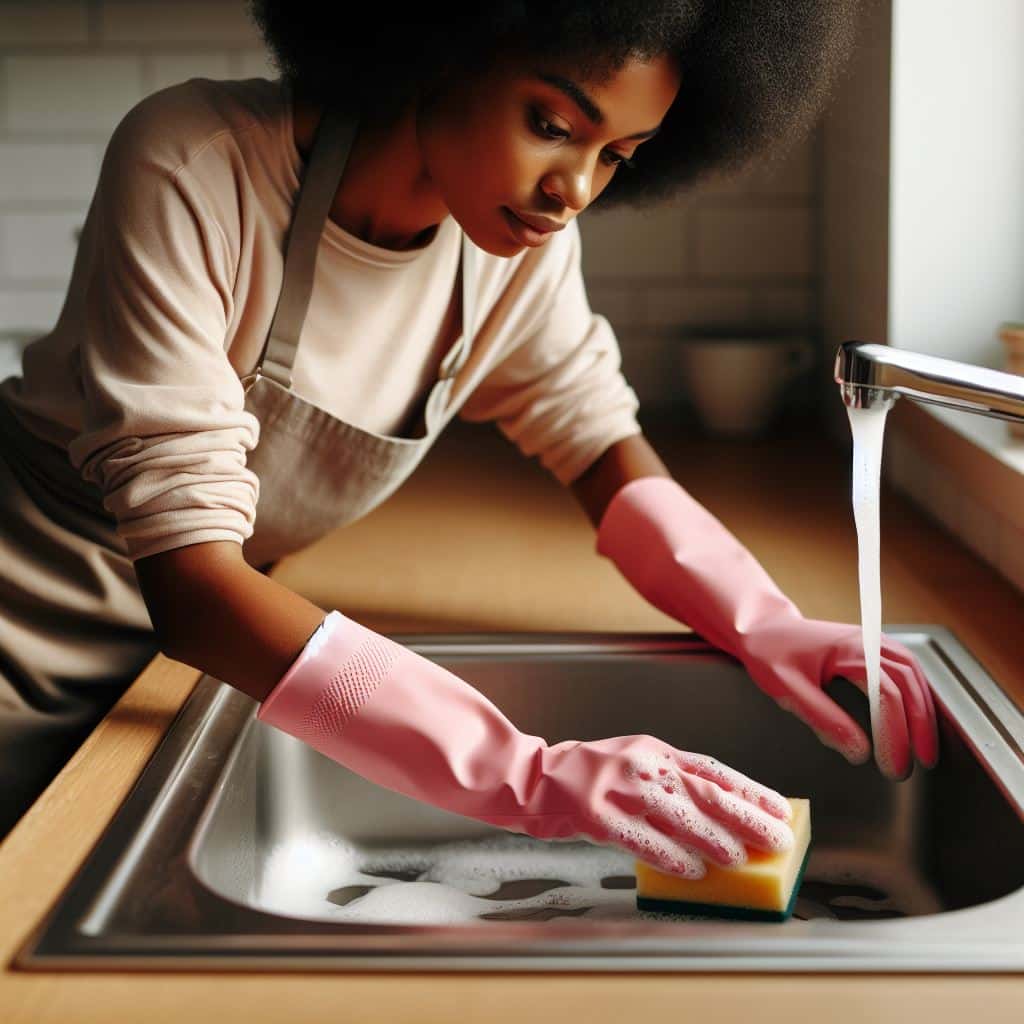To remove grease from a sink, use a mixture of baking soda and vinegar followed by hot water. This method effectively breaks down and flushes out grease build-up.
Dealing with a greasy sink can be annoying, but it doesn’t have to be troublesome. Wondering ‘How to Get Grease Out of Sink?’ Kitchen sinks often accumulate grease from dishwashing and food preparation, leading to clogs and unpleasant smells over time.
Keeping your sink grease-free isn’t just about maintaining a clean kitchen; it’s also about ensuring your plumbing stays in top condition.
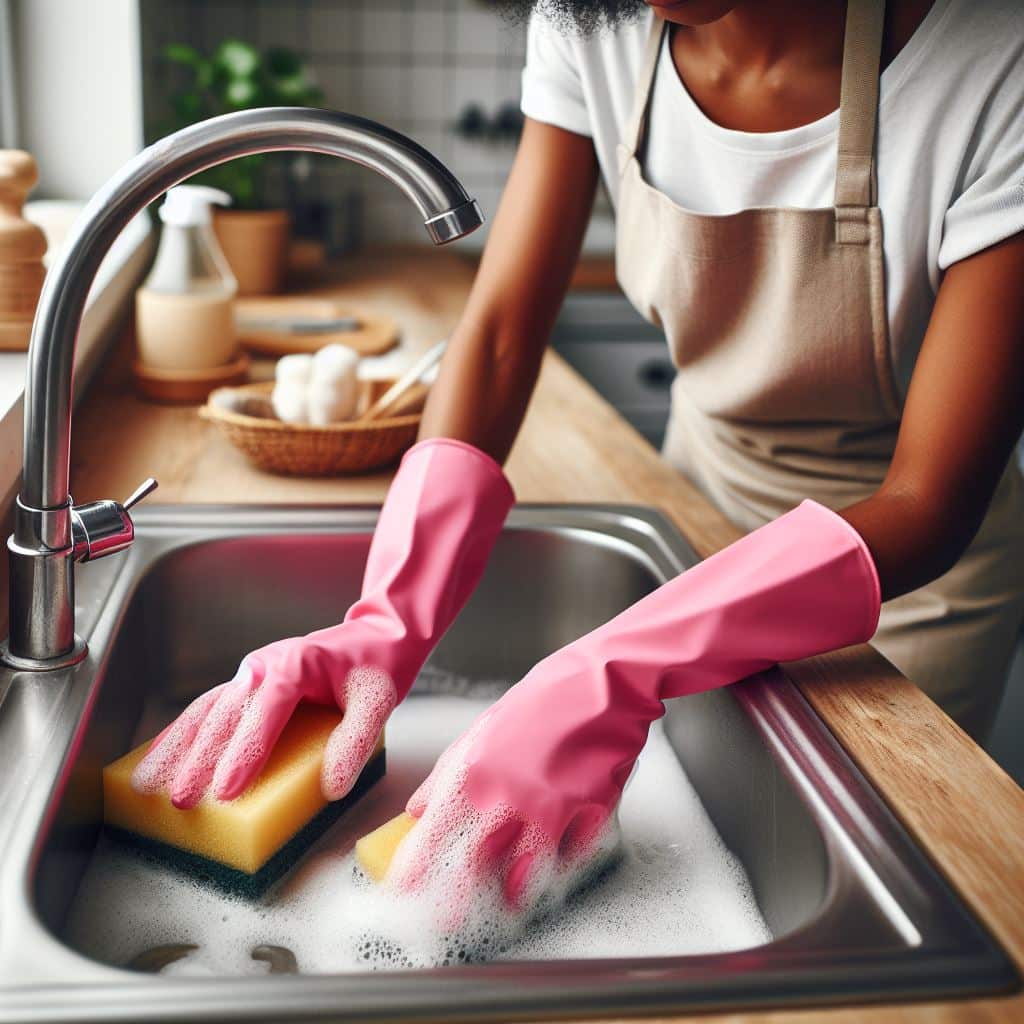
Whether you’re tackling a minor grease issue or a major blockage, the right approach can make all the difference. Following the initial step with regular cleaning practices will help prevent future build-up and keep your sink flowing smoothly.
Engaging in this simple yet effective maintenance routine will save you from the hassles of more complicated and costly plumbing repairs.
Grease Mess in Sinks
Picture this: you’ve just fried up a storm in the kitchen. The meal was delicious, but now, there’s a greasy pan that needs cleaning. As you wash the dishes, that slick, oily residue from your scrumptious feast silently slips down your sink.
It seems harmless at first, but grease in sinks is like an iceberg—what lurks beneath can cause a titanic problem. Let’s drop into the oily abyss of grease issues in your plumbing.
The Issue With Grease In Plumbing
Grease might glide off your pans with ease, but in your pipes, it’s a different story. When grease cools, it solidifies, sticking to your plumbing like gum to a shoe.
Over time, this can build into a stubborn blockage, trapping food particles and other debris. Blocked pipes restrict water flow, leading to slow drains or even a complete stoppage. Knowing how grease behaves in your plumbing is vital to keeping your kitchen’s arteries clear.
Why Grease Accumulation Is A Serious Concern For Homeowners
Think of grease as the cholesterol of your home’s plumbing. Just as bad cholesterol can cause health issues, grease build-up in pipes poses serious threats to your home’s well-being.
Repeated blockages can lead to costly repairs and may result in unpleasant odors, which nobody wants wafting through their home.
Worse still, it puts a strain on the overall sewage system, which could spell disaster. Homeowners need to tackle grease before it takes a toll on their pipes and pockets.
- Grease clogs lead to slow drainage.
- Blockages result in back-ups and overflows.
- Repairing grease damage can be expensive.
- Bad odors are a common symptom of grease build-up.
The Science Of Grease Accumulation
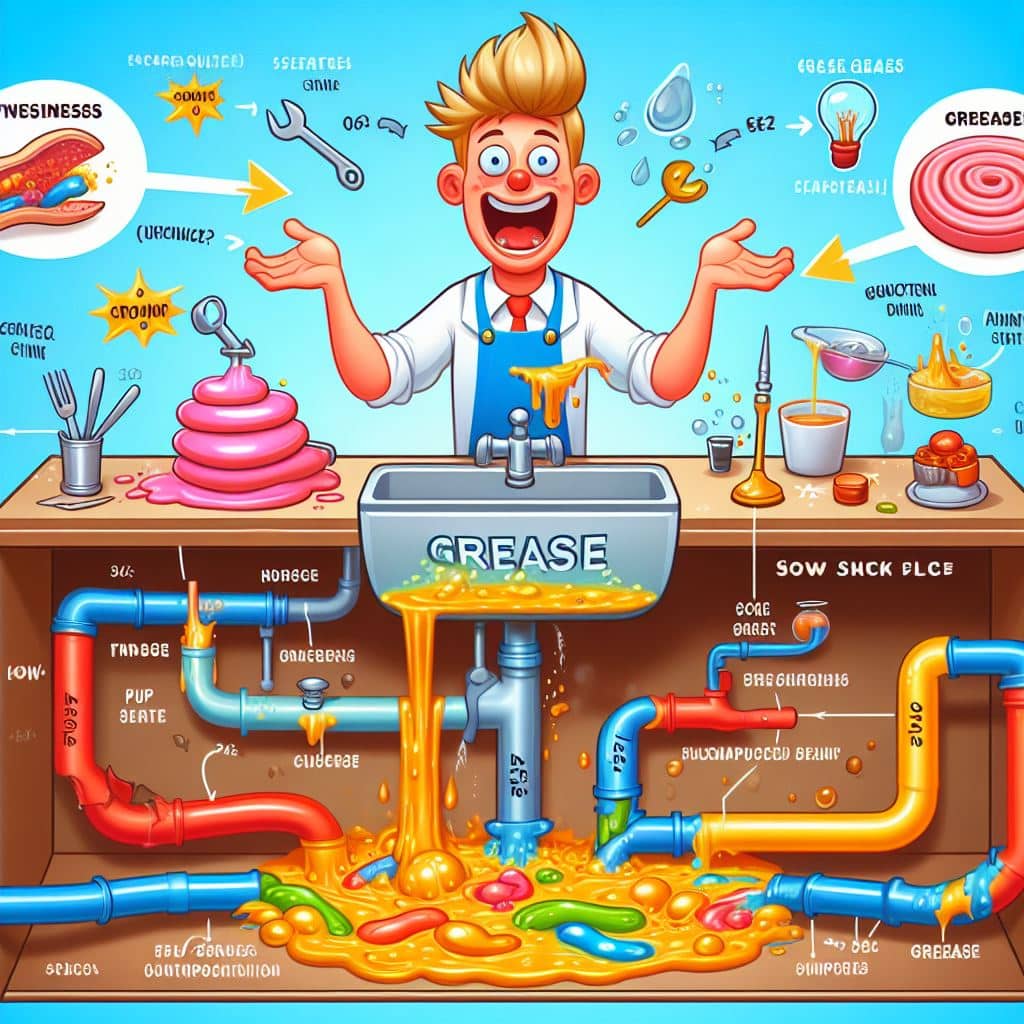
The Science of Grease Accumulation is fascinating as much as it is a common household problem. Understanding why grease sticks around in your kitchen sink requires a drop into its chemical makeup.
It clings to pipes, causing clogs and backups. Let’s break down how this happens and explore effective solutions.
Chemical Properties Of Grease And Its Interaction With Water
Grease consists mostly of fats and oils. These substances are hydrophobic, which means they don’t mix with water. In terms of chemistry, water is a polar molecule, while grease is non-polar, resulting in this separation.
When grease goes down your sink, it initially remains in its liquid form due to warmth but quickly cools and solidifies upon contact with colder pipes.
- Grease is non-polar and repels water.
- Sinks often provide a cooling environment, causing grease to harden.
- Once solidified, it starts to catch food particles and other debris.
How Grease Builds Up In Pipes Over Time
Consistent disposal of grease down the sink lays the groundwork for build-up. Layers of grease begin to form inside pipes, narrowing their diameter.
This process reduces water flow and leads to blockages. Over time, the grease layers become a sticky trap for food particles, creating larger clogs.
| Time Frame | Effect on Pipes |
|---|---|
| Immediately | Grease sticks to pipe walls. |
| Short Term | Layers form and catch debris. |
| Long Term | Significant blockages occur. |
- Initial stage: Grease adheres to the pipe lining.
- Progression: Repeated exposure leads to layering.
- Outcome: Diameter reduction and clogging.
Preventive Measures To Avoid Grease Buildup
Preventing grease buildup in your sink is vital for a clean and functional kitchen. Before tackling how to clear out that pesky grease, let’s discover some key practices for avoiding the problem in the first place. With simple kitchen habits, you can maintain free-flowing pipes and a pristine sink.
Best Practices For Disposing Of Grease
Disposing of grease the right way means not down the drain. Here are the steps you should follow:
- Let it cool – After cooking, allow grease to cool in the pan.
- Scrape into a container – Use a spoon to move the grease to a container.
- Seal and throw away – Once the container is full, seal it and toss it in the trash.
For liquid oils, soak them up with absorbent materials like paper towels before disposal. Moreover, consider reusing grease for cooking, where applicable, to minimize waste.
Kitchen Habits to Reduce Grease Going Down the Sink
Kitchen Habits To Reduce Grease Going Down The Sink
| Tip | Explanation |
|---|---|
| Use sink strainers | Catch food scraps and bits that often carry grease. |
| Wipe plates | Before washing, wipe off grease with a paper towel. |
| Hot water flush | Regularly run hot water to clear the pipes. |
Regular pipe cleaning with baking soda and vinegar helps too. This natural mix breaks down early-stage buildups. Always remember: A small effort today can prevent a big plumbing issue tomorrow. Start incorporating these habits into your routine and keep your sink free-flowing!
Home Remedies For Grease Removal
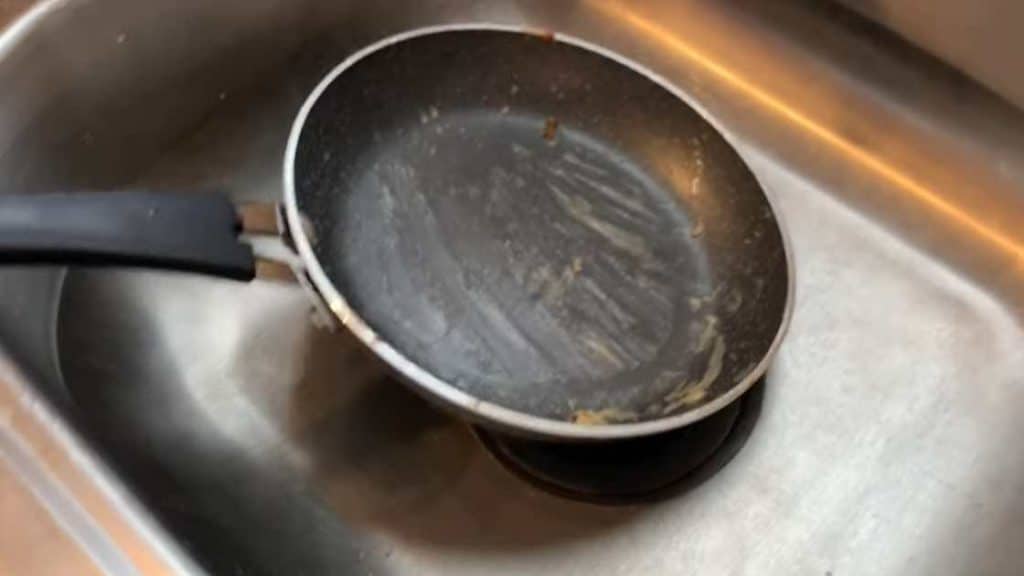
Welcome to the Home Remedies for Grease Removal section of our blog. Discover effective and simple ways to tackle stubborn grease in your sink using ingredients likely already in your kitchen. Let’s roll up our sleeves and get started!
Diy Solutions With Baking Soda And Vinegar
When it comes to natural cleaning power, baking soda, and vinegar are a match made in heaven. This dynamic duo works wonders on grease, breaking it down without harsh chemicals. Here’s a quick guide:
- Pour hot water down the sink to soften the grease.
- Sprinkle a cup of baking soda into the sink.
- Follow with a cup of white vinegar.
- Wait for the mixture to fizz and work its magic for 5 minutes.
- Flush the sink with boiling water.
The Effectiveness Of Hot Water And Dish Soap
Hot water and dish soap are a trusted combination. Dish soap cuts through grease while hot water flushes the remnants away. Follow these steps:
| Step | Instructions |
|---|---|
| 1 | Fill the sink with very hot water. |
| 2 | Add a generous squirt of dish soap. |
| 3 | Use a brush to scrub the mixture around the sink. |
| 4 | Drain the sink and rinse with more hot water. |
Commercial Products To Tackle Grease
Battling a greasy sink can be daunting. Ready-made solutions simplify this messy task. Commercial products designed for grease removal work effectively. They dissolve the grime, ensuring a spotless sink with minimal effort.
Recommended Enzymatic Cleaners For Grease
Enzymatic cleaners are standout solutions in the fight against grease. These cleaners break down fat molecules. The process is simple and safe for most plumbing systems. Look below for top enzymatic cleaners:
- Grease-Eating Enzyme X: Efficient for tough grease blockages.
- Sink Shine Plus: Combines enzymes and a fresh scent.
- EcoEnzyme Sink Destroyer: Eco-friendly and powerful.
Chemical Versus Natural Sink Cleaning Products
| Chemical Cleaners | Natural Solutions |
|---|---|
| Contains strong substances, often providing quick results. | Use substances like vinegar and baking soda for safe cleaning. |
| May be harmful to the environment and require careful handling. | Environmental-friendly and safe for family use. |
| Specially designed formulas target grease directly. | Effective for light grease accumulation. |
Choose wisely between chemical and natural products. Consider the severity of the grease problem. Assess your safety and environmental preferences.
Mechanical Methods For Grease Extraction
Over time, sink drains get clogged with grease, making water flow tough. Before reaching for chemical cleaners, consider mechanical methods. These methods rely on manual tools to remove clogs directly.
They are often safer for your pipes. Let’s discover how plungers, plumber’s snakes, and hydro-jetting can tackle grease buildup.
Using Plungers And Plumber’s Snakes To Clear Grease Clogs
Plungers are not just for toilets. A cup plunger can work well for sinks. Follow these steps:
- Fill the sink: Add a little water to cover the cup of the plunger.
- Seal the drain: Place the plunger over the drain opening.
- Pump: Push and pull without lifting the plunger. This builds pressure.
- Clear the clog: The force can dislodge the grease, clearing the path.
Plumber’s snakes, or drain augers, are flexible cleaning tools. They twist through the pipes. Once they hook the grease, rotate and pull to remove it.
- Insert: Guide the snake cable into the drain.
- Extend: Crank the handle to push it further down.
- Hook the clog: You will feel resistance when it reaches the grease.
- Remove: Rotate and extract the snake, pulling the grease with it.
Professional Tools: Hydro-jetting And Its Impact On Grease
Hydro-jetting is a powerful clean-out method. It uses high-pressure water to break up grease. This equipment must be operated by professionals. Here’s how it works:
- High pressure: Water blasts through the pipes.
- Scours the pipes: The water stream removes grease lining the walls.
- Safe for pipes: No harsh chemicals mean less wear and tear.
- Effective: It reaches areas snakes can’t, fully clearing the system.
Biological Solutions For Grease Disposal
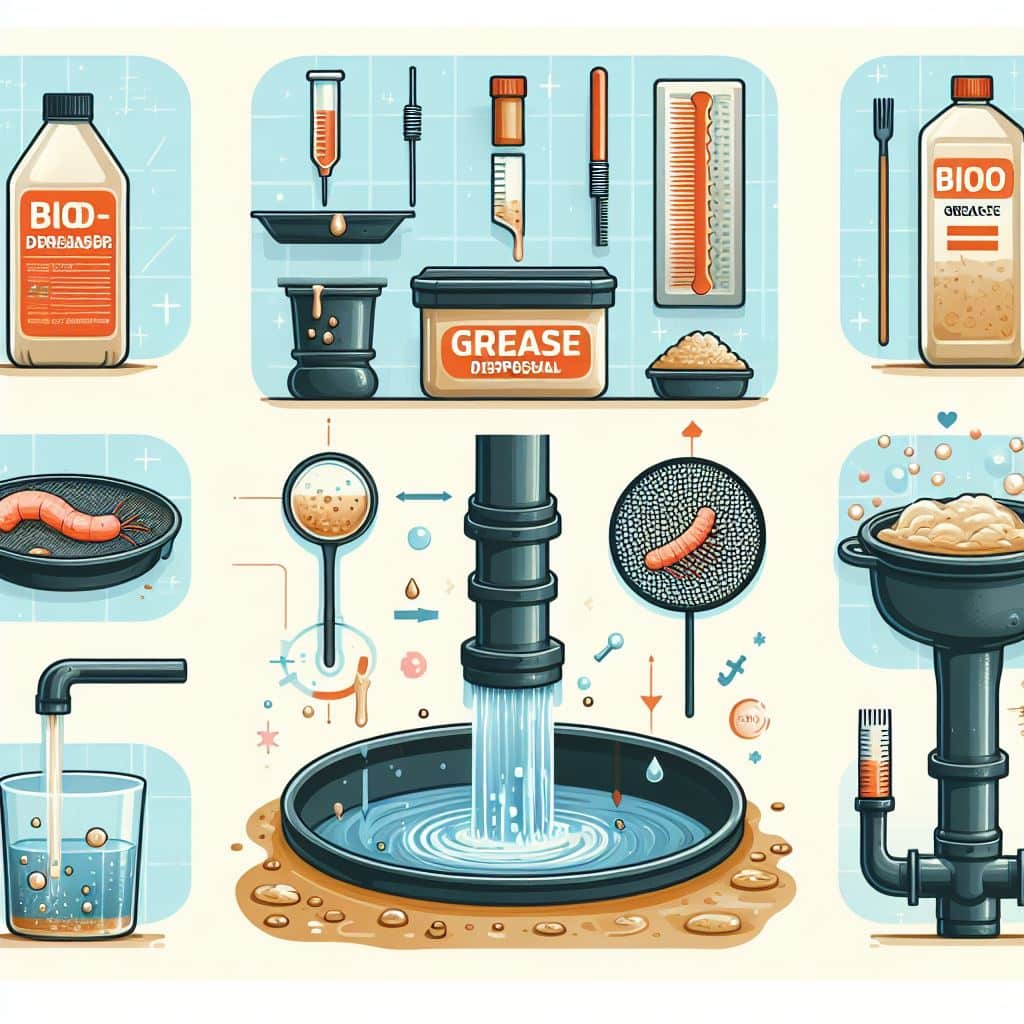
Dealing with a greasy sink can seem daunting. But fear not! Nature offers amazing solutions. Biological grease disposal methods are not just effective.
They are kind to the earth too. Let’s discover options that use nature’s power to break down grease. These methods keep plumbing clean without harsh chemicals.
Role Of Bacterial And Enzyme Drain Cleaners
Enzyme and bacterial cleaners are nature’s way to tidy up. When poured down the sink, they start a feast on grease. Enzymes break down fats into smaller pieces.
- Bacteria eat these bits, leaving your pipes clean.
- They are safe for plumbing and the environment.
- Regular use keeps grease from building up again.
Sustainable Practices With Bio-cleaners
Bio-cleaners are not just about cleaning. They are part of green living.
Using them often, we help the planet in small ways. Here are some tips for sustainable use:
- Mix with warm water for better results.
- Avoid hot water as it can kill good bacteria.
- Use regularly for maintenance instead of a quick fix.
By picking biological solutions, we take a step towards a healthier home and planet.
Professional Services For Severe Grease Clogs

Stubborn grease in your sink can be more than a nuisance. It can signal a deep-seated problem in your plumbing. Simple home remedies might not cut it for severe grease clogs.
This is where professional services come into play. Experts have the right tools and skills to tackle the toughest of blockages.
When To Call A Plumber For Grease-related Issues
Not all grease clogs require a professional, but here are some clear signs that it’s time to call a plumber:
- Dish soap and hot water don’t clear the sink.
- Home drain cleaners fail to resolve the issue.
- Water drains slower than usual, even after trying simple fixes.
- Bad odors persist near your sink.
- Water backs up regularly, indicating a severe clog.
The Process And Cost Of Professional Grease Removal
A professional plumber follows a methodical approach to remove grease from your sink:
- Inspection – They examine your plumbing to assess the clog.
- Diagnosis – Using cameras, they find the clog’s location and size.
- Treatment – They use professional-grade tools to dissolve or extract the grease.
- Prevention advice – They provide tips to avoid future clogs.
The cost varies based on the severity and location of the clog. Here’s a general breakdown of possible expenses:
| Service | Cost Range |
|---|---|
| Inspection | $50 – $100 |
| Grease Removal | $150 – $200 |
| Preventive Maintenance | $100 – $300 |
Maintenance And Regular Cleaning Schedules
Keeping a sink grease-free is not just a once-in-a-while task. Think of your sink as a hard-working kitchen partner.
Like all good partnerships, it thrives on regular attention and care. A strict maintenance and cleaning schedule ensures your sink stays spot-free and functions flawlessly.
Creating An Effective Sink Maintenance Routine
A good sink maintenance routine can keep grease at bay. Include these steps in your daily cleanup:
- Wipe down the sink after each use.
- Hot water flush: Run hot water for a minute to clear oils.
- Baking soda scrub: Sprinkle baking soda and scrub gently once a week.
- Vinegar rinse: Follow up with vinegar for a deep clean.
- Use mesh drain screens to catch food particles.
These quick daily and weekly actions can prevent grease buildup.
The Importance Of Regular Professional Inspections
While DIY maintenance is essential, professionals spot things we miss. Aim for a professional inspection once a year. Consider these benefits:
| Inspection Benefit | Why It Matters |
|---|---|
| Expert cleaning | Technicians can deep clean areas beyond our reach. |
| Pipe health check | They examine pipes for any damage or wear. |
| Grease clog prevention | Early detection of grease buildup minimizes risks. |
Do not skip professional check-ups; they are your sink’s best defense.
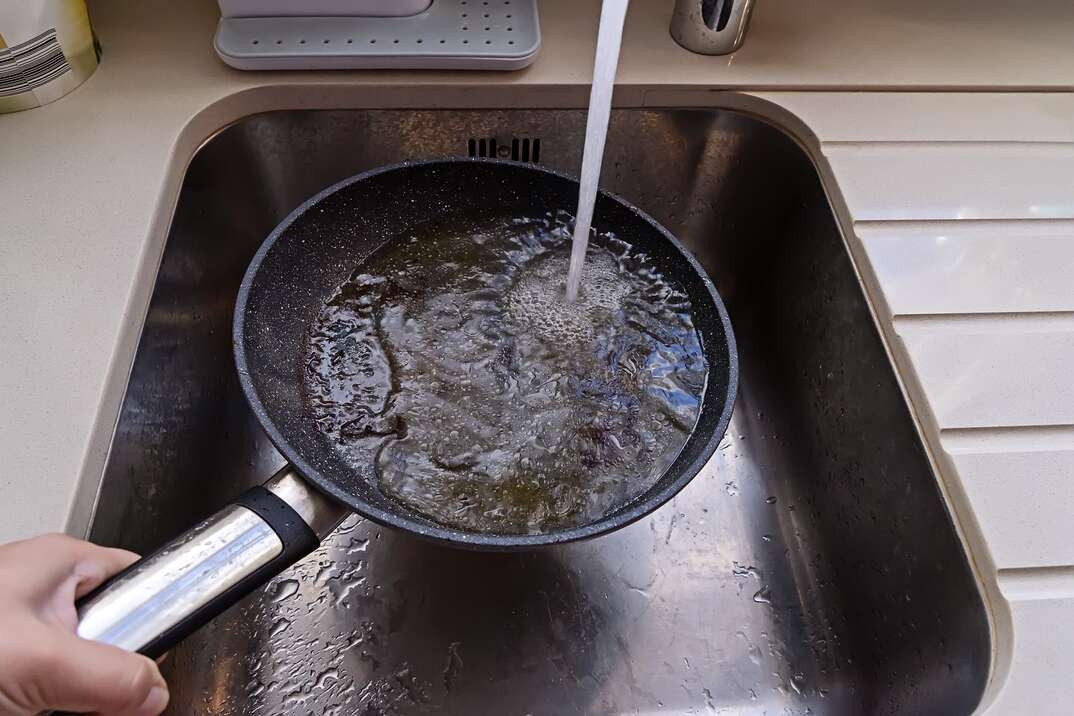
Best Practices Recap
We’ve discovered many ways to tackle grease in your sink. Now, let’s summarize the key strategies and best practices to keep in mind.
Summarizing The Key Approaches To Getting Grease Out Of The Sink
- Use boiling water to dissolve the grease.
- Baking soda and vinegar can break down grease deposits.
- Dish soap tackles grease by emulsifying it.
- A plunger may help dislodge grease buildup.
- Enzymatic cleaners digest grease naturally.
- Professional plumbing tools can clear severe blockages.
Adopting A Proactive Approach To Sink Maintenance
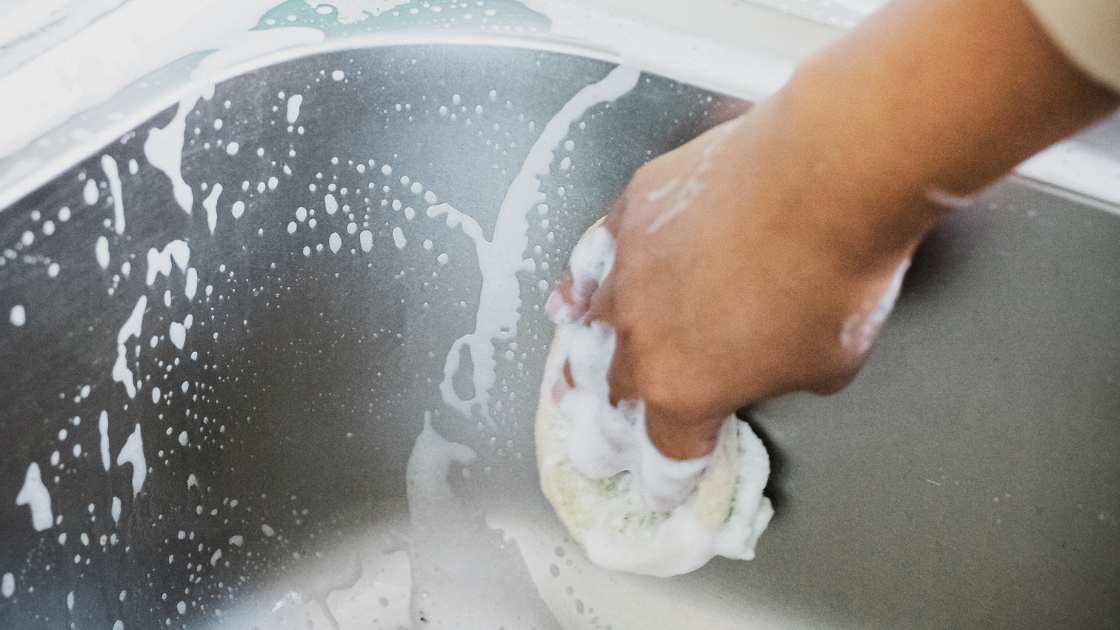
For a clean, functional sink, embrace these habits:
- Catch grease before it enters your sink with kitchen traps.
- Regularly pour hot water down the drain to prevent buildup.
- Clean your sink after dishwashing to remove residual oils.
- Dispose of oil in the trash, not the sink.
- Schedule routine drain cleaning to avoid clogs.
By following these practices, your sink remains free-flowing and hygienic.
Frequently Asked Questions Of How To Get Grease Out Of Sink
Can Baking Soda And Vinegar Clear Sink Grease?
Baking soda and vinegar can effectively break down grease in sinks. Pour a cup of baking soda followed by a cup of white vinegar. The mixture will fizz, helping to dissolve the grease. Flush with boiling water after 10 minutes to clear residue.
What Dissolves Grease In Kitchen Sinks?
Dish soap and hot water are excellent for dissolving grease. Apply a generous squirt of grease-fighting liquid dish soap down the drain. Follow this with a kettle of boiling water to melt and flush away the grease. Repeat if necessary for stubborn grease build-up.
Are Chemical Drain Cleaners Safe For Grease Blockages?
Chemical drain cleaners can remove grease, but use them cautiously. They’re powerful and can clear grease clogs, but may damage pipes if overused. Opt for a cleaner specifically designed for grease and follow the instructions closely to protect your plumbing.
Is It Possible To Prevent Grease Buildup In Sinks?
To prevent grease buildup, never pour grease directly down the sink. Instead, dispose of grease in the trash. Regularly use hot water and dish soap or vinegar and baking soda mix to maintain clear pipes and avoid future blockages.
How do you get grease out of a sink drain?
To remove grease from a sink drain, start by pouring boiling water down the drain to loosen the grease. Follow this with a mixture of equal parts vinegar and baking soda, allowing it to sit for 15 minutes before flushing with hot water again to clear the residue.
What is the best drain cleaner for grease?
The best drain cleaner for grease is typically one that is specifically formulated to break down and dissolve grease and oil deposits. Look for products with ingredients like enzymes or powerful degreasers, as they are effective in tackling grease clogs and preventing future buildups in your drains.
Conclusion
Dealing with sink grease can be daunting, but not anymore. Embrace these simple steps for a spotless kitchen. Remember, regular maintenance beats heavy-duty cleaning. Don’t let grease build up and spoil your sink’s shine. Stay clean, stress less, and enjoy a sparkling kitchen with ease.

